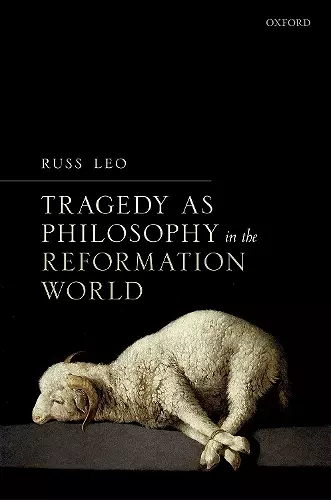Tragedy as Philosophy in the Reformation World
Format:Hardback
Publisher:Oxford University Press
Published:29th Jan '19
Currently unavailable, and unfortunately no date known when it will be back

Tragedy as Philosophy in the Reformation World examines how sixteenth- and seventeenth-century poets, theologians, and humanist critics turned to tragedy to understand providence and agencies human and divine in the crucible of the Reformation. Rejecting familiar assumptions about tragedy, vital figures like Philipp Melanchthon, David Pareus, Lodovico Castelvetro, John Rainolds, and Daniel Heinsius developed distinctly philosophical ideas of tragedy, irreducible to drama or performance, inextricable from rhetoric, dialectic, and metaphysics. In its proximity to philosophy, tragedy afforded careful readers crucial insight into causality, probability, necessity, and the terms of human affect and action. With these resources at hand, poets and critics produced a series of daring and influential theses on tragedy between the 1550s and the 1630s, all directly related to pressing Reformation debates concerning providence, predestination, faith, and devotional practice. Under the influence of Aristotle's Poetics, they presented tragedy as an exacting forensic tool, enabling attentive readers to apprehend totality. And while some poets employed tragedy to render sacred history palpable with new energy and urgency, others marshalled a precise philosophical notion of tragedy directly against spectacle and stage-playing, endorsing anti-theatrical theses on tragedy inflected by the antique Poetics. In other words, this work illustrates the degree to which some of the influential poets and critics in the period, emphasized philosophical precision at the expense of--even to the exclusion of--dramatic presentation. In turn, the work also explores the impact of scholarly debates on more familiar works of vernacular tragedy, illustrating how William Shakespeare's Hamlet and John Milton's 1671 poems take shape in conversation with philosophical and philological investigations of tragedy. Tragedy as Philosophy in the Reformation World demonstrates how Reformation took shape in poetic as well as theological and political terms while simultaneously exposing the importance of tragedy to the history of philosophy.
Leo's TPRW offers a selection of insightful analyses that could interest a range of scholars in different fields, including reception history of the Bible and of Aristotle, historical theology, history of philosophy, history of the Protestant Reformation, literary criticism, and hermeneutics, and it may even help a tragedian or two. There is so much of value here. * Philip Thomas Mohr, Ad Fontes *
Russ Leo's Tragedy as Philosophy in the Reformation World is an impressive, and humbling, work of meticulous scholarship. * Kirk Essary, Parergon *
In exploring the history of the second possibility, Leo shows us how early modern scholars and playwrights tried to get a glimpse of things not as they seem to be, but as they actually are. * Raphael Magarik, MAKE: Literary Magazine *
ISBN: 9780198834212
Dimensions: 243mm x 162mm x 23mm
Weight: 586g
312 pages